|
no. 1 january - march 2007
Sean Keefe is a member of the PCM Province who has worked in Australia for a number of years. He currently is the campus minister at the Carmelite secondary school Whitefriars in Donvale. Prior to going to Australia, he worked in education in the PCM Province. He was professed in August 1967. Things we too often take for granted are major issues in Zumalai, East Timor where the Carmelite have a parish. Even the basic issue of what language to use is not a given. In the up coming elections, one of the major issues is deciding (again) what is the official language? With no electricity, a slaughtered goat in East Timor must be totally consumed or it spoils. The river polluted by human and animal waste is a major source of water for the people. In a country where the average age is 21, people are looking to better themselves by work or study, it is a matter of opening a few doors for them. The official language in East Timor is Portuguese which only a very small minority speak. The common language is Tetum, which is an oral language although its written form is being developed. School textbooks in Tetum exist for students up to the fourth grade. The written language continues to be Indonesian, which, because of history between the two nations, provokes anger and recalls bad memories for the people. The other language used is English.
In Zumalai the teachers were not being paid and as a result they made little effort to teach. Students were showing up for school but there were no teachers. The East Timorese Carmelites now pay the teachers only when they show up for work. When they do not show, they do not get paid. Funding by the Carmelites has been assured. The students at Whitefriars College in Donvale (just outside Melbourne, Australia) donated enough money to hire two teachers for the whole 12 month school year. For Christmas, the staff of Whitefriars College donated enough money to hire teachers for next year. So the cycle has been broken and students are beginning to receive a consistent education. No one survives without water. In East Timor there are two seasons- dry and wet. In addition to the water coming from a polluted river, the containers used to transport the water are themselves a medical hazard. There is little understanding of hygiene. With the combination of catching the rain water in tanks and having control over its purity during distribution to the people, can improve the situation. Br. Sean hopes to introduce a way to keep the containers cleaner by using a sanitizer to wash the containers.
One of the most significant changes that could occur in Zumalai would be the introduction of electricity. Engineers Without Borders is an Australian group working in East Timor. For US$9,500 they could install equipment to provide solar electricity for Zumalai. This would create jobs. It would enhance education, providing access to computers and a variety of teaching aids. It would mean families could store food. Located only 400 miles off the northern coast of Australian, East Timor continues to be the poorest country in Asia. The Carmelite parish there consists of 26 villages. Zumalai is a ten hour trip in a four wheel drive pickup from the capital of East Timor, Dili, a distance of only 130 miles!
1)
People gather water for all the needs of their families.
With 18 members- five priests, eight simply professed members and five postulants- in two houses, the Baetica Province has begun building a strong mission in Burkina Faso in Africa. Bobadioulaso is the novitiate house, a gift from the Bishop of Bobo. Dejando la de las hermanas Donum Dei que esta siendo arreglada para se entregrada a sus dueñas. The community ministers, other than with the focus on the students in formation, in pastoral work. Carmelite Eugene Kaborè also teaches at the Seminary of Kumi. Carmelites Francisco Daza and Alain Diallo teach at the area secondary schools. Fr. Eugene is also spiritual director at an area prison. At the request of the bishop, Fr. Fransicso coordinates the youth ministry at the schools around the city. The newer foundation, at Ouagadougou, stresses the students’ formation in community life. Three separate but connected houses, each with three bedrooms, two bathrooms, and a large room and kitchen were purchased. One of the large rooms is a combination refectory/recreation room, another is a study room, and the third is a chapel. It is a simple place but has what is needed to live comfortably. This new community works well with regular meetings: the formation community meets monthly and the postulant community meets weekly on such topics as Carmelite spirituality, liturgy, music, and communications. In addition, there is a retreat and the Sacrament of Reconciliation offered on a monthly basis.
There is no novitiate this current year. The various projects approved at the last Chapter of the Baetica Province are moving toward completion. The new water well promises an abundant supply of good drinking water. The water tower and pump have yet to be completed. In December, three members of the Carmelite lay missionary group in Osuna, Spain, a nurse, a psychologists, and an emergency medical doctor, visited the Carmelite orphanages in Lumbilá and Reo as well as the communities in Bobo and Ouago. 1) Members of the Burkino Faso mission of the Baetica
Province. |
|
RETURN TO THE INDEX FOR 2007 | RETURN TO THE INDEX FOR THIS ISSUE INDEX OF CARMELITE
WEBSITES |

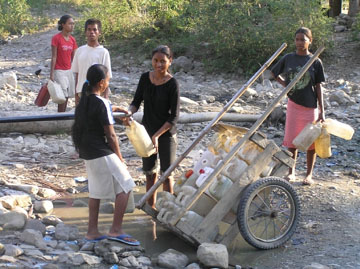 The Carmelites in East Timor
The Carmelites in East Timor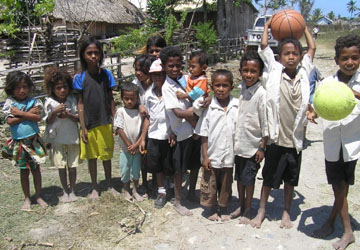 The young Carmelites in East Timor pray in English to familiarize
themselves with the sounds. They study in Portuguese because that is the
official language of the Church in the country. They speak Tetum. Their
classes are in Indonesian. It is an amazing labyrinth to navigate just to
get an education.
The young Carmelites in East Timor pray in English to familiarize
themselves with the sounds. They study in Portuguese because that is the
official language of the Church in the country. They speak Tetum. Their
classes are in Indonesian. It is an amazing labyrinth to navigate just to
get an education.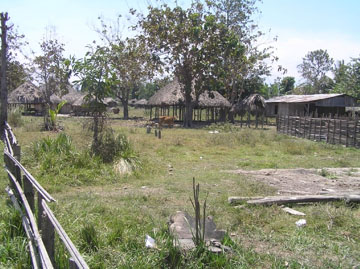 This small step has another benefit—that of creating jobs. To put in
the tanks, the people will need to dig out an area for the tanks to sit.
Installing the pipes will require more people and useful training. The
ultimate hope is the creation of a water processing company which will
keep the containers clean and deliver the water to the villagers.
This small step has another benefit—that of creating jobs. To put in
the tanks, the people will need to dig out an area for the tanks to sit.
Installing the pipes will require more people and useful training. The
ultimate hope is the creation of a water processing company which will
keep the containers clean and deliver the water to the villagers.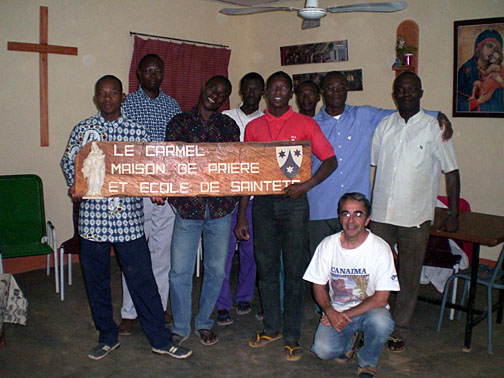
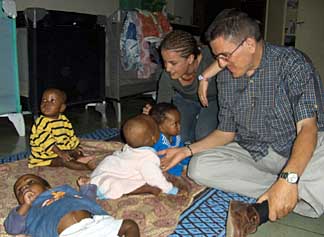 Fr. Jean Patrice Basole teaches moral theology at the seminary and the
Carmelite students attend these classes.
Fr. Jean Patrice Basole teaches moral theology at the seminary and the
Carmelite students attend these classes.